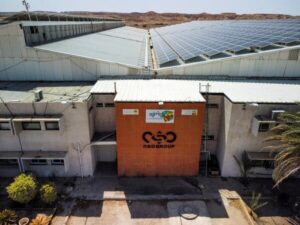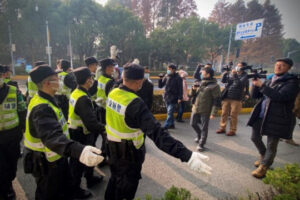
The National Interest Foundation Newsletter
Issue 132, February 3, 2022
Welcome to our NIF Newsletter. In this week’s headlines: Israel’s president visits the United Arab Emirates as social justice activists lament the normalization of relations at the expense of Palestinians, a New York Times investigation details how Israel has used the heavily criticized NSO Group’s spyware as a core element of its diplomacy efforts, rights groups implore U.S. President Biden against re-blacklisting the Houthis in Yemen, and a new report finds that media freedom in China is declining significantly with foreign journalists subjected to growing intimidation tactics.
Israeli President Visits the UAE

Analysts have highlighted the major shortcomings of the Abraham Accords. (Photo from AP)
Israel’s President Visits the United Arab Emirates as Social Justice Activists Lament the Normalization of Relations at the Expense of Palestinians
President Isaac Herzog is the latest high-level member of the Israeli government to visit the United Arab Emirates, as activists have lamented the normalization of relations which have taken place at the expense of social justice for Palestinians. Impartial analysts have conveyed justifiable criticism toward the so-called Abraham Accords, pointing out that the United Arab Emirates and others who signed on broke with the longstanding position that fair Israeli concessions must first be made to Palestinians in order to ensure substantial and concrete advancements in the peace process. They have also expressed that the deal merely formalized already existing Israeli ties with autocratic governments in the region, and the legitimate concern that it serves to solidify the status quo and the universally-condemned illegal Israeli occupation of Palestinian territory. Additionally, the majority of citizens in Arab countries do not support diplomatic normalization with Israel until Palestinian rights are secured but because of the repressive nature of many of the regimes, public opinion often has little effect on policy. Activists have voiced their frustration with the disregard of their governments to the plight of Palestinians and tried to draw attention to how the Abraham Accords have in actuality played a role in this as well.
Use of Spyware in Israeli Diplomacy

Israel has utilized the spyware as a tool in an attempt to obtain diplomatic gains. (Photo from Reuters)
A New York Times Investigation Details Israel’s Use of the Heavily Criticized NSO Group’s Spyware as a Core Element of Its Diplomacy Efforts
A year-long investigation by the New York Times has documented instances where Israel has used the widely-criticized NSO Group’s Pegasus spyware as a tool and form of currency in its diplomacy efforts. The NSO Group, which clears all sales of its product through the Israeli government, has been sold to some of the most repressive perpetrators of human rights abuses in the world. The malware has been deployed by these leaders and their governments – whose track records with respect to human rights and the rule of law should place them at odds with countries who profess to value freedom and democracy – in order to spy on journalists, human rights lawyers and activists, and opposition leaders. Israel has authority to approve or deny the sale of the Pegasus software, and entities that garnered access to it have, among other things, altered their votes at the United Nations to support Israeli policy positions. Nearly all of the signatories to the Abraham Accords were granted a negotiated access to the spyware. Other occurrences uncovered by the investigation include Saudi Arabia, who though not a signatory to the deal, threatened to block it if their contract to use the software was not renewed. Additionally, after Israel formalized an agreement to sell India sophisticated weaponry that included the Pegasus software, India switched its vote in the United Nations to deny observer status to a Palestinian human rights organization. Hungary, a customer of NSO Group too, was the only European Union government to not criticize Israel’s annexation plans of Palestinian land in the West Bank back in 2020.
Calls Against Re-Blacklisting the Houthis

A re-blacklisting would have a detrimental impact on the ability to deliver much-needed aid and humanitarian services to civilians in Yemen. (Photo from Reuters)
Rights Groups Implore U.S. President Biden Against Re-Blacklisting the Houthis in Yemen
Rights groups are urging U.S. President Joe Biden against re-blacklisting the Houthis in Yemen and highlighting that the potential move would have a devastating effect on the ability to deliver much-needed aid and basic goods to the country. President Biden raised alarms and elicited concern about this when he stated in a recent news conference that his administration was considering re-designating Yemen’s Houthi movement as an international terrorist organization. This is likely due to pressure from the United Arab Emirates after a Houthi-claimed attack on Abu Dhabi airport and a fuel depot. The United Arab Emirates, a member of the often-criticized Saudi-led coalition fighting the group in Yemen, publicly requested that the Biden administration take this action. The war in Yemen has created what many experts deem to be the worst humanitarian disaster in the world, and as such, there is a desperate need for aid services. The Biden administration was praised for revoking the terrorist designation put in place by former President Trump, citing the damaging impact it could have on Yemeni civilians’ access to aid. Much of the Yemeni population relies on these international humanitarian operations, as the ongoing conflict has brought the country to the verge of widespread famine. The war has claimed an estimated 230,000 lives since 2015 according to U.N. estimates, and 131,000 of these are directly linked to food insecurity and lack of access to health services.
Report on Media Freedom in China

The report raises concerns about the increased harassment faced by foreign reporters in particular. (Photo from AFP)
New Report Finds That Media Freedom in China is Declining Significantly
A recent report released by the Foreign Correspondents’ Club of China (FCCC) has detailed the decline of media freedom in China, which has been taking place at “breakneck speed.” The findings come just as China prepares to host the 2022 Beijing Winter Olympics that are set to begin this Friday, and adds to the existing scrutiny over the state of human rights that the country was already facing. The Chinese government has long been accused of committing grave abuses against the Uyghur population in Xinjiang province and they have also drawn widespread criticism for their repressive crackdown in Hong Kong. The preceding weeks have seen several countries announce diplomatic boycotts of the Beijing Winter Olympics, including the United States under the Biden administration. Now, the latest FCCC report has highlighted the fact that many journalists are being subjected to increased harassment and intimidation tactics from the Chinese government as well, prompting some to leave mainland China and make emergency exit plans.
